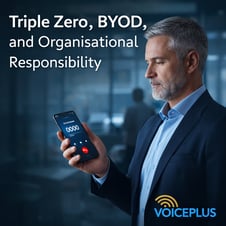11 July 2025
When was the last time you looked into your organisation’s mobile device policy?
Knowing your policies is critical because the way we work has changed over the last few years. As hybrid work, BYOD, and AI tools become everyday realities, businesses need a policy that reflects how devices are actually used — across time zones, apps, and networks.
So, if you want to stay compliant, productive, and threat-free, revisit your policies, from your BYOD policy to what’s in your device security policy.
What Is a Mobile and Computer Device Policy?
A mobile device policy defines how corporate and personal devices are used in a business context. More than a step-by-step manual, it’s a framework of responsibilities and expectations covering:
- Security
- Device usage
- Data governance
Without clear policy guidelines, every device becomes not an asset but a security gap that’s open to exploitation.
Why Outdated Policies Are a Risk
Many older policies were written for a time before BYOD, remote work, AI tools, or unsecured messaging apps entered the picture. Today, hybrid work environments mean more devices in more locations — and often with fewer controls.
Employees are now able to use their own smartphones to access email, cloud drives, and CRMs. Worse yet, AI applications and social media blur the line between personal and professional tools.
Without a hybrid work device policy, your business may be exposed to breaches, data loss, or compliance failures.
What Should Be Covered in a Modern Policy?
A strong mobile device policy addresses both security and productivity. Under the Essential Eight Framework for devices, a policy should include:
- Acceptable use rules for personal and corporate devices
- Security protocols like encryption, password standards, and multi-factor authentication
- Requirements for MDM (Mobile Device Management) enrolment, particularly for BYOD
- Guidelines for AI tools, social media, and messaging apps
- Data ownership rules for mixed-use devices
- Procedures for international roaming and travel security
- Clear expectations around privacy, monitoring, and remote wipe authority
Why You Should Review Your Policy Annually
Device risks evolve quickly. AI agents now pose new threats to data security and identity spoofing. Messaging habits shift. New phones and platforms enter the workplace every year.
Aligning your policy with standards like the Essential Eight or ISO 27001 helps protect against growing threats. Annual reviews ensure your policy reflects current realities and incorporates insights from IT, HR, legal, and employees on the ground.
VoicePlus supports many organisations in this process by delivering regular updates to our clients’ MDM configurations and device policies — ensuring they stay aligned with the latest mobility risks and compliance frameworks.
How We Can Help
As a trusted provider of managed mobility services, we help businesses develop and enforce policies tailored to their environment. Through our MDM solutions, we’re able to:
- Secure endpoints
- Control app access
- Enforce encryption
- Enable selective and remote data wipe on lost or decommissioned devices.
Stay Ahead of Mobile Security Risks
A well-crafted current mobile device policy is a must-have for your organisation. Providing guardrails on user behaviour and device access protects your data, supports your teams, and reduces costly surprises.
Have you noticed areas of improvement in your mobile device policy? We can help keep it aligned with today’s security demands.
Contact us today to future-proof your organisation’s mobile environment.
3 Strategies to Reduce Telecom Cost




